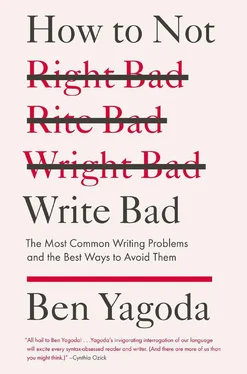A final apostrophe issue is where (if anywhere) it’s placed in formulations like Farmers Market, Boys Club , and Stockholders Meeting .
I confess that I find this a toughie. What helps clear it up for me is pretending that the first word in the phrase is men —or women or children or any plural that doesn’t end in s. You would never write men room, men department, or men club, and you obviously shouldn’t write mens room, mens department , etc. (because there is no such word as mens ). Instead, the correct forms would be men’s room, men’s department , and men’s club. It works out that almost always the apostrophe should follow the s . And the above examples should be Farmers’ Market, Boys’ Club, and Stockholders’ Meeting. In fact, in phrases like this, the apostrophe should almost always follow the s. (The exception, such as farmer’s tan, Mother’s Day , or, speaking of songs, “ It’s a Man’s World ,” comes where the reference is to the prototypical singular farmer, mom, or man.)
c. This Should Not Be Necessary, but…
Do not write your (possessive of you ) instead of you’re (contraction of you are ) or it’s (contraction of it is ) instead of its (possessive of it ), or vice versa. If you do, it looks very bad and you will be mocked. Spell-check will not help you out. You just need to be mindful.
d. An Incredibly Geeky Point
In typewriter days, the keyboard provided a single vertical mark to indicate apostrophe, opening single quote, and closing single quote. But in a published text, these are not the same. The apostrophe and the closing single quote are the same and look like this: ’. The opening single quote looks like this: ‘.
This was no problem back then: if a typewritten (or handwritten) text was going to be published, typesetters would take care of sorting out the apostrophes and single quotes. The trouble came with the arrival of word processing programs. Computer keyboards also have a single key for those three symbols, but the programs offer print-style fonts and think they are smart enough to figure out which symbol you want in a particular situation. That’s not always the case, however. Consider the following sentence, which I let Microsoft Word have its way with:
[ Rock ‘n’ roll was very big in the ‘60s. ]
There should be an apostrophe before n and 60s , to indicate stuff that is left out, the same way the apostrophe works in contractions like can’t or I’m . Instead, there is an opening single quote. I admitted this was a geeky point, and the fact is that 99 percent of people, or more, won’t notice the problem. But to me it counts as bad writing. If you agree and want to correct the error, there are various workarounds. The one I use is to trick the program by typing a second apostrophe after the incorrect one:
[ Rock ‘’n’ roll was very big in the ‘’60s. ]
Then if you delete the incorrect one, you will be left with true apostrophes:
Rock ’n’ roll was very big in the ’60s.
2. -
Hyphenation can cause vexation. It certainly did in one of my students, who handed in an article containing this sentence:
[ Our day began with a run down of the up-coming shark cage diving experience. ]
At three points in the sentence, he had to make one of three choices: separate words, hyphenated phrase, or one word. He made a wrong choice every time. Rundown and upcoming may have been separate or hyphenated at one time in the history of the English language (that’s generally the way phrases evolve over time— base ball to base-ball to baseball ), but now they’re one word. How are you supposed to know that? Well, the more you read, the more you get a feel for it. But leaving that aside, there’s a simple answer: LOOK THEM UP IN THE DICTIONARY! Do the same for words formed with prefixes like un, self, ex, all, de, non , and re.
That sounds a little easier than it is and brings up a conundrum I think of as the Blind Spot Problem. It derives from the notion of the vehicular blind spot — the idea that, while driving, you cannot see some areas of the road through your rearview or side mirrors or by looking due left or due right, and thus you have to turn around to see if it’s okay to change lanes, a risky move at high speeds.
If you are puzzled or unsure about a particular issue of spelling, punctuation, or grammar (a known unknown), there is help to be had in various kinds of online and print resources. But what if you aren’t aware that you aren’t aware of how it’s supposed to be done? That’s the Blind Spot Problem (BSP for short). Where it presents the biggest problem, nowadays, is the general issue of word separation. There seems to be a widespread desire to take compound words that have been recognized as such for decades, sometimes centuries, and take them apart again. I have read countless assignments with such phrases as:
Work place
Long time (adjective)
Life time
Fire works
Weather man
Mean time
Some times
Touch down (in foot ball; I mean, football )
Under ground (adjective)
So how do you defeat the blind spot and realize that you don’t know? My best answer is the equivalent of craning your neck in a car. (Fortunately, this is totally safe at your desk or in the library.) That is, teach yourself that there is a category of unknowns having to do with the question of one word, two words, or a hyphenation. Learn to recognize the situations where the question arises, and that the trend of the English language over time is toward one-word compounds. If you have to make a choice — let’s say you want to refer to an underground, under-ground , or under ground bunker — and if you are anything less than 100 percent certain which one it should be, look it up, in a dictionary or on a reliable Web site.
The first couple of dozen times, your neck will probably feel pretty sore from all that virtual craning. But after time you’ll get a sense of the way the rules work, and you can cruise along
Speaking of the rules, let’s get back to my student who referred to a shark cage diving experience . He couldn’t have looked that up, since the dictionary doesn’t have an entry for it, but he shouldn’t have had to. Shark cage diving is a compound adjective — that is, a phrase, made up of two or more words, that modifies a noun — and compound adjectives before a noun ( experience ) get hyphenated:
my shark-cage-diving experience
any school-age children
some out-of-date and messed-up ideas
a seven-year-old boy
the happy-face button
an I-just-ate-something-that-really-disagreed-with-me expression
There are three notable situations where a compound adjective is not hyphenated. The first is when the modifying phrase consists of all adjectives or an adverb followed by an adjective. For example, A standard yellow school bus is a remarkably attractive vehicle. Second, you don’t hyphenate proper nouns or extremely familiar two-word phrases. Thus, Our high school graduation was held in the Yankee Stadium parking lot. (One exception to this is the quaintly named institution The New-York Historical Society, a classic test for copyeditors.) And finally, the hyphens are usually dispensed with when the compound phrase stands alone — that is, does not precede a noun:
Читать дальше












